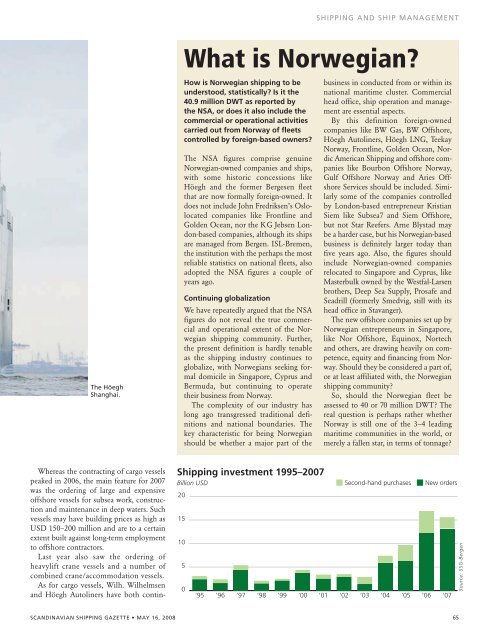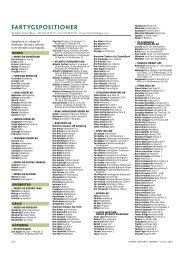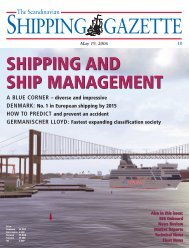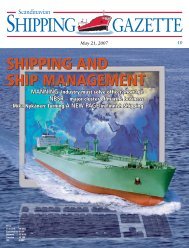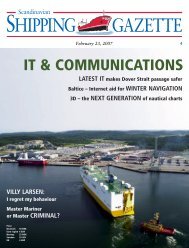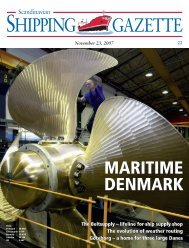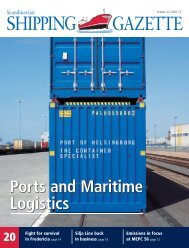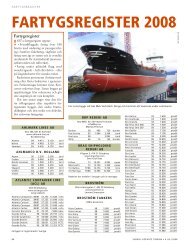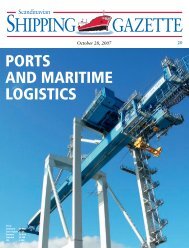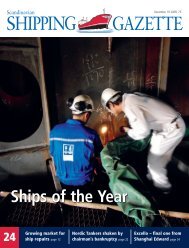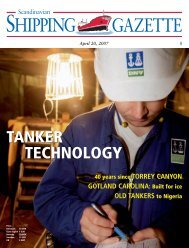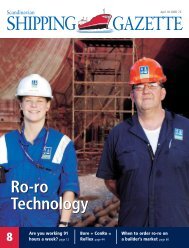SSG No 10 - Shipgaz
SSG No 10 - Shipgaz
SSG No 10 - Shipgaz
- TAGS
- shipgaz
- shipgaz.com
Create successful ePaper yourself
Turn your PDF publications into a flip-book with our unique Google optimized e-Paper software.
The Höegh<br />
Shanghai.<br />
Whereas the contracting of cargo vessels<br />
peaked in 2006, the main feature for 2007<br />
was the ordering of large and expensive<br />
offshore vessels for subsea work, construction<br />
and maintenance in deep waters. Such<br />
vessels may have building prices as high as<br />
USD 150–200 million and are to a certain<br />
extent built against long-term employment<br />
to offshore contractors.<br />
Last year also saw the ordering of<br />
heavylift crane vessels and a number of<br />
combined crane/accommodation vessels.<br />
As for cargo vessels, Wilh. Wilhelmsen<br />
and Höegh Autoliners have both contin-<br />
what is <strong>No</strong>rwegian?<br />
How is <strong>No</strong>rwegian shipping to be<br />
understood, statistically? Is it the<br />
40.9 million DWT as reported by<br />
the NSA, or does it also include the<br />
commercial or operational activities<br />
carried out from <strong>No</strong>rway of fleets<br />
controlled by foreign-based owners?<br />
The NSA figures comprise genuine<br />
<strong>No</strong>rwegian-owned companies and ships,<br />
with some historic concessions like<br />
Höegh and the former Bergesen fleet<br />
that are now formally foreign-owned. It<br />
does not include John Fredriksen’s Oslolocated<br />
companies like Frontline and<br />
Golden Ocean, nor the K G Jebsen London-based<br />
companies, although its ships<br />
are managed from Bergen. ISL-Bremen,<br />
the institution with the perhaps the most<br />
reliable statistics on national fleets, also<br />
adopted the NSA figures a couple of<br />
years ago.<br />
Continuing globalization<br />
We have repeatedly argued that the NSA<br />
figures do not reveal the true commercial<br />
and operational extent of the <strong>No</strong>rwegian<br />
shipping community. Further,<br />
the present definition is hardly tenable<br />
as the shipping industry continues to<br />
globalize, with <strong>No</strong>rwegians seeking formal<br />
domicile in Singapore, Cyprus and<br />
Bermuda, but continuing to operate<br />
their business from <strong>No</strong>rway.<br />
The complexity of our industry has<br />
long ago transgressed traditional definitions<br />
and national boundaries. The<br />
key characteristic for being <strong>No</strong>rwegian<br />
should be whether a major part of the<br />
business in conducted from or within its<br />
national maritime cluster. Commercial<br />
head office, ship operation and management<br />
are essential aspects.<br />
By this definition foreign-owned<br />
companies like BW Gas, BW Offshore,<br />
Höegh Autoliners, Höegh LNG, Teekay<br />
<strong>No</strong>rway, Frontline, Golden Ocean, <strong>No</strong>rdic<br />
American Shipping and offshore companies<br />
like Bourbon Offshore <strong>No</strong>rway,<br />
Gulf Offshore <strong>No</strong>rway and Aries Offshore<br />
Services should be included. Similarly<br />
some of the companies controlled<br />
by London-based entrepreneur Kristian<br />
Siem like Subsea7 and Siem Offshore,<br />
but not Star Reefers. Arne Blystad may<br />
be a harder case, but his <strong>No</strong>rwegian-based<br />
business is definitely larger today than<br />
five years ago. Also, the figures should<br />
include <strong>No</strong>rwegian-owned companies<br />
relocated to Singapore and Cyprus, like<br />
Masterbulk owned by the Westfal-Larsen<br />
brothers, Deep Sea Supply, Prosafe and<br />
Seadrill (formerly Smedvig, still with its<br />
head office in Stavanger).<br />
The new offshore companies set up by<br />
<strong>No</strong>rwegian entrepreneurs in Singapore,<br />
like <strong>No</strong>r Offshore, Equinox, <strong>No</strong>rtech<br />
and others, are drawing heavily on competence,<br />
equity and financing from <strong>No</strong>rway.<br />
Should they be considered a part of,<br />
or at least affiliated with, the <strong>No</strong>rwegian<br />
shipping community?<br />
So, should the <strong>No</strong>rwegian fleet be<br />
assessed to 40 or 70 million DWT? The<br />
real question is perhaps rather whether<br />
<strong>No</strong>rway is still one of the 3–4 leading<br />
maritime communities in the world, or<br />
merely a fallen star, in terms of tonnage?<br />
Shipping investment 1995–2007<br />
Billion USD � Second-hand purchases � New orders<br />
20<br />
15<br />
<strong>10</strong><br />
5<br />
0<br />
‘95<br />
‘96<br />
‘97<br />
SCANDINAVIAN SHIPPING GAZETTE • MAY 16, 2008 65<br />
‘98<br />
‘99<br />
‘00<br />
SHIPPING AND SHIP MANAGEMENT<br />
‘01<br />
‘02<br />
‘03<br />
‘04<br />
‘05<br />
‘06<br />
‘07<br />
Source: <strong>SSG</strong>-Bergen


